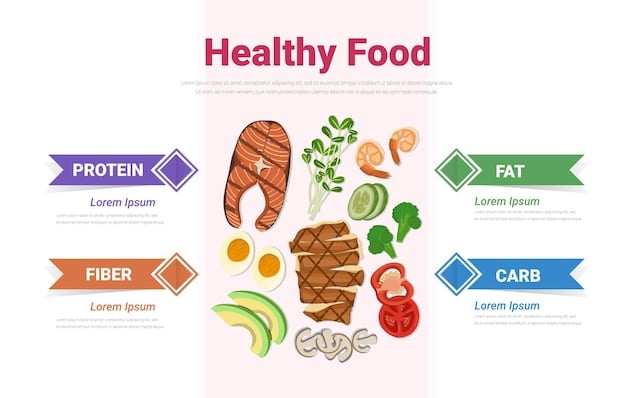Are Plant-Based Diets Healthier? A Comprehensive Comparison

Are plant-based diets really healthier? A comprehensive comparison reveals that well-planned plant-based diets can offer numerous health benefits, including reduced risk of chronic diseases, but nutritional balance is key for optimal health.
Navigating the world of nutrition can feel like traversing a complex maze. One of the most debated topics is whether are plant-based diets really healthier? A comprehensive comparison is crucial to understanding the nuances and making informed choices about our dietary habits.
Understanding Plant-Based Diets
Plant-based diets are more than just salads; they encompass a wide range of eating patterns that prioritize foods derived from plants. This section delves into what defines a plant-based diet and the various forms it can take.
What is a Plant-Based Diet?
A plant-based diet emphasizes whole, minimally processed foods derived from plants, such as fruits, vegetables, grains, legumes, nuts, and seeds. The term encompasses various dietary patterns, from vegan to flexitarian.
Different Types of Plant-Based Diets
- Vegan: Excludes all animal products, including meat, poultry, fish, dairy, eggs, and honey.
- Vegetarian: Excludes meat, poultry, and fish but may include dairy and eggs.
- Pescatarian: Includes fish but excludes meat and poultry.
- Flexitarian: Primarily plant-based but occasionally includes meat, poultry, or fish.
Understanding these distinctions is vital because each variation has its own set of nutritional considerations. A flexitarian diet, for example, might offer a more straightforward transition for those accustomed to eating meat, while a vegan diet requires careful planning to ensure adequate nutrient intake.

In essence, plant-based eating is about making plants the cornerstone of your diet, tailoring the approach to fit your individual needs and preferences. This flexibility is one reason why plant-based diets have gained popularity, offering a sustainable and adaptable way to promote health and well-being.
Nutritional Benefits of Plant-Based Diets
The allure of plant-based diets often lies in their potential health benefits. This section will explore the specific nutritional advantages that a well-planned plant-based diet can offer.
Rich in Vitamins and Minerals
Plant-based diets are typically high in vitamins, minerals, and antioxidants. These essential nutrients play crucial roles in maintaining overall health and preventing chronic diseases.
High in Fiber
Fiber is abundant in plant-based foods, promoting digestive health, regulating blood sugar levels, and aiding in weight management. A diet rich in fiber can also reduce the risk of heart disease and type 2 diabetes.
Lower in Saturated Fat and Cholesterol
Plant-based diets are inherently lower in saturated fat and cholesterol, which are often associated with an increased risk of heart disease. By reducing the intake of these substances, individuals can improve their cardiovascular health.
While the nutritional benefits are compelling, it’s crucial to recognize that these advantages are contingent on proper planning. Simply cutting out meat and relying on processed plant-based foods might not yield the same positive outcomes. A balanced approach, focusing on whole, nutrient-dense foods, is essential to truly reap the benefits of a plant-based diet.

Potential Risks and Considerations
While plant-based diets offer numerous advantages, it’s essential to consider potential risks and nutritional gaps. This section will explore common deficiencies and how to address them effectively.
Vitamin B12 Deficiency
Vitamin B12 is primarily found in animal products, making deficiency a significant concern for vegans. A lack of B12 can lead to neurological problems and anemia.
Iron Deficiency
Although iron is present in plant-based foods, it is in a non-heme form, which is less readily absorbed by the body. This can increase the risk of iron deficiency, especially for women of reproductive age.
Omega-3 Fatty Acids
Plant-based diets may lack sufficient amounts of omega-3 fatty acids, particularly EPA and DHA, which are crucial for brain health and reducing inflammation.
Addressing these potential deficiencies requires careful planning and supplementation. Vegans may need to take B12 supplements or consume fortified foods. To improve iron absorption, pair iron-rich foods with vitamin C. For omega-3s, consider algae-based supplements or include flaxseeds, chia seeds, and walnuts in the diet.
Health Outcomes: Research and Studies
Scientific research plays a pivotal role in understanding the long-term effects of plant-based diets. This section will review key studies and their findings regarding health outcomes.
Reduced Risk of Heart Disease
Numerous studies have shown that plant-based diets are associated with a lower risk of heart disease. This is attributed to their lower saturated fat and cholesterol content, as well as their high fiber and antioxidant levels.
Lower Risk of Type 2 Diabetes
Research indicates that plant-based diets can improve insulin sensitivity and glucose control, reducing the risk of type 2 diabetes. A high fiber intake and lower glycemic index contribute to these benefits.
Cancer Prevention
Some studies suggest that plant-based diets may reduce the risk of certain cancers, particularly colorectal cancer. The high antioxidant and phytochemical content in plant-based foods is believed to play a protective role.
It’s important to note that while these findings are promising, more research is needed to fully understand the long-term effects of plant-based diets. Factors such as overall diet quality, lifestyle, and genetics can also influence health outcomes.
Comparing Plant-Based and Omnivorous Diets
To provide a balanced perspective, it’s essential to compare plant-based diets with omnivorous diets. This section will highlight the pros and cons of each approach.
Nutrient Availability
Omnivorous diets typically provide a more readily available source of certain nutrients, such as vitamin B12, iron, and omega-3 fatty acids. However, they may also be higher in saturated fat and cholesterol.
Environmental Impact
Plant-based diets generally have a lower environmental impact compared to omnivorous diets. The production of animal products requires more land, water, and energy, contributing to greenhouse gas emissions and deforestation.
Accessibility and Affordability
The accessibility and affordability of both diets can vary depending on geographic location and socioeconomic status. Plant-based diets can be cost-effective when based on whole, unprocessed foods, while omnivorous diets may be more accessible in certain regions.
Ultimately, the choice between a plant-based and omnivorous diet depends on individual preferences, health goals, and ethical considerations. Both diets can be healthful when properly planned to meet nutritional needs.
Making the Transition to a Plant-Based Diet
Transitioning to a plant-based diet can be a gradual and enjoyable process. This section will provide practical tips and strategies for making a successful switch.
Start Slowly
Begin by incorporating more plant-based meals into your current diet. Gradually reduce your intake of animal products over time.
Focus on Whole Foods
Prioritize whole, unprocessed plant-based foods, such as fruits, vegetables, grains, legumes, nuts, and seeds. Minimize your consumption of processed plant-based alternatives, which may be high in sodium and unhealthy fats.
Plan Your Meals
Meal planning is essential for ensuring adequate nutrient intake. Plan your meals in advance and include a variety of plant-based foods to meet your nutritional needs.
Remember, transitioning to a plant-based diet is a personal journey. Be patient with yourself, experiment with new recipes, and seek support from registered dietitians or plant-based communities. With careful planning and a commitment to nutrient-dense foods, you can enjoy the many health benefits of a plant-based lifestyle.
| Key Point | Brief Description |
|---|---|
| 🌱 Nutritional Benefits | Rich in vitamins, minerals, and fiber, promoting overall health. |
| ⚠️ Potential Risks | Vitamin B12, iron, and omega-3 deficiencies require careful planning. |
| ❤️ Health Outcomes | Reduced risk of heart disease, type 2 diabetes, and certain cancers. |
| 🌍 Environmental Impact | Lower environmental footprint compared to omnivorous diets. |
Frequently Asked Questions
▼
Plant-based diets can be suitable for most people, but it’s essential to consider individual health needs and consult with a healthcare professional. Proper planning is crucial to ensure adequate nutrient intake.
▼
Yes, you can get enough protein from plant-based sources such as legumes, tofu, tempeh, nuts, seeds, and whole grains. Variety and proper planning are key to meeting your protein needs.
▼
Plant-based diets can be very cost-effective when focused on whole, unprocessed foods like beans, lentils, and seasonal produce. Costs can increase with processed vegan alternatives.
▼
Vegans should take vitamin B12 supplements or consume fortified foods, such as plant-based milk and nutritional yeast, to prevent deficiency and maintain optimal health.
▼
Good plant-based sources of omega-3 fatty acids include flaxseeds, chia seeds, walnuts, and algae-based supplements. These can help meet your body’s needs for these essential fats.
Conclusion
In conclusion, a well-planned plant-based diet offers numerous health benefits, including a reduced risk of chronic diseases and a lower environmental impact. While potential risks exist, such as nutrient deficiencies, they can be effectively addressed through careful planning and supplementation. Ultimately, the choice between a plant-based and omnivorous diet depends on individual preferences and health goals, but prioritizing whole, nutrient-dense foods is key to optimal health.





